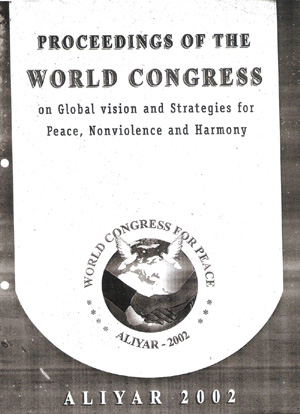 Click on Images to Enlarge
Click on Images to Enlarge |
RELIGION, POWER AND VIOLENCE Prof. ZEENAT SHAUKAT AI Prof. Zeenat Shaukat Ali is Professor of Islamic Studies, St.Xavier's College, Mumbai. Good morning everybody: Honourable Maharishi, whom I deeply respect, and dignitaries on the stage, distinguished members in the audience and the members of the press. I will try to make a synopsis but, I feel aware of the fact I am the first woman speaker in the last one and half a days. So to start with, to wake you up a little before my presentation to you on "Religion, power and violence", I would like to tell a little story about women. It is said that once Hillary and Bill Clinton were taking a ride in their car and while driving the car it suddenly ran out of petrol. So they went to the nearest petrol station. The person who was filling the gas happened to be Hillary's former boyfriend, and Bill was very well aware of it. So he looked at her sardonically and said, "Hillary, if you had married him where would you be now?" Now, Hillary is a smart woman: she looked back at him, and smilingly said, "Bill, if I had married him, he would have been President of United States of America and I would still be First Lady." Now, to come to my theme: The issue of violence in its various manifestations and the question of whether world communities, religions or others can contribute, in co-operation, towards resolving the problem through building a culture of sustainable peace and conflict transformation is the center of national and international debate today. The discussion on violence in recent years is related to the alarming and rapid increase of conflicts since the end of the cold war. Since the collapse of the Soviet Union in 1989-1991. and the onset of the so-called post-cold war era, a generalized increase in acts of violence is seen in Afghanistan, Algeria, Bosnia, Chechnya, Cyprus, Kashmir, Kosovo, India, Indonesia, Pakistan, Nigeria, Northern Ireland, Tibet, and Israel/Palestine. It has been observed that in such conflicts, religion together with ethnicity and violence features as an identity maker in order to define group membership. Subsequently, the role of religion and its relationship to violence has been drawn into the debate. Particularly in situations of civil conflict and unrest, religious traditions, symbols and affiliations are mobilized to lend legitimacy to the claims of the conflicting parties. Hence, even in ethno-political or interstate conflicts, religion invariably becomes profoundly implicated in one form or another. In addition to interstate conflicts and several civil conflicts, acts of violence within a society where religion is implicated are visible. Violence against women, refugees, foreigners, racial minorities, disabled persons, violence by and against children etc., dowry deaths and even sati is re-asserting itself. IF YOU NEED FURTHER INFORMATION KINDLY CONTACT DR. ZEENAT SHAUKAT ALI AT THE MAIL ADDRESS wisdomfoundationindia@hotmail.com |
